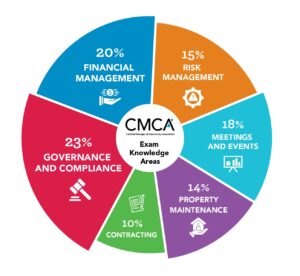UPDATED CMCA EXAM BLUEPRINT
The Evolution of the CMCA Exam Blueprint
The Community Association Managers International Certification Board (CAMICB) has implemented significant updates to the Certified Manager of Community Associations (CMCA) exam blueprint, ensuring it reflects the evolving demands of community association management. These changes, based on a comprehensive job analysis conducted between 2021 and 2022, ensure the CMCA exam remains a relevant and authoritative assessment tool for early-career managers.
Grounded in Research: The Job Analysis (2021–2022)
The updated CMCA exam blueprint is grounded in a rigorous job analysis study that assessed the tasks and knowledge areas critical to community association managers. Key elements of this study included:
- Analysis of over 100 primary source documents.
- Survey responses from 3,000 managers worldwide.
- Over 90 hours of collaboration with 55 subject matter experts, including 20 international professionals.
This thorough validation process, spanning 18 months, ensures the exam reflects real-world challenges and responsibilities faced by community managers globally.
Key Changes in the Updated Blueprint (2024)
The revised blueprint organizes job tasks and knowledge into six principal categories, replacing the previous eight. Notable updates include:

- Domain Consolidation:
- Categories such as “Budgets, Reserves, Investments, and Assessments” and “Financial Controls” are now streamlined under broader headings like Financial Management and Risk Management.
- Increased Emphasis:
- Meetings and Events expand from 10% to 18%, reflecting its critical role in managers’ responsibilities.
- Property Maintenance and Risk Management increase by 3% and 4%, respectively.
- Reduced and Removed Content:
- Contracting decreases from 13% to 10%.
- The Human Resources domain, previously 6% of the exam content, has been removed.
These updates align the exam with the modern, multifaceted responsibilities of community managers.
Looking Ahead: Future Job Analysis (2026–2027)
To maintain the CMCA exam’s relevance in an ever-changing industry, CAMICB plans to launch its next job analysis survey in 2026–2027. This survey will ensure that future updates to the exam blueprint continue to reflect the latest trends and challenges in community association management.
